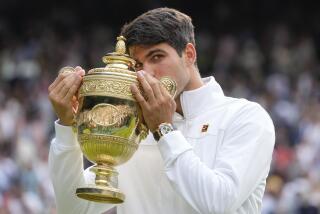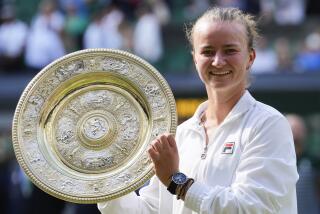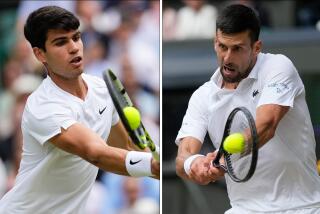Novak Djokovic shows relentless drive in Wimbledon victory
- Share via
WIMBLEDON, England — In the end here Sunday, the right player probably won, the man named Novak Djokovic, who can bend like Gumby, run like Usain Bolt and hit tennis shots at the other guy like Roger Federer.
What made his victory in the Wimbledon men’s final the ultimate was that other guy was Roger Federer.
The Wimbledon men’s final, more often than not, produces some of the best theater of the year in sports. This one is a candidate.
Djokovic, a 27-year-old Serb in the prime of his career, beat Federer, the soon-to-be 33-year-old who has earned the designation as the master of his sport with his record 17 major titles. That this one didn’t turn out to be No. 18, or a record No. 8 at Wimbledon, should not detract from his effort.
When Djokovic finally prevailed, 6-7 (7), 6-4, 7-6 (4), 5-7, 6-4, it was difficult to establish a loser. It was not difficult to establish that both players had left every bit of their heart, soul, blood and sweat on the most famous tennis court in the world.
Federer battled back from certain defeat in four sets when he wiped out a 5-2 lead. You just don’t do that on grass when you have given that kind of advantage to a player such as Djokovic.
It was 2 hours 55 minutes into it when Djokovic served for the match. He had it at 30-all, which was two points from the title. But Federer got to a rare break point, only his fourth of the match.
“That I couldn’t break serve for three sets, that was disappointing,” Federer said.
He wasn’t disappointed this time. He stroked a winner, wrong-footing Djokovic and sending him sprawling to the court, one of several falls he had during the match that resulted in two calls for medical help.
Djokovic had lost his service break advantage, but in the next game, on Federer’s serve, he got right where he wanted to be — at match point.
Then it got weird.
Federer hit a serve near the line that was called out. Federer, not a huge fan of the hawkeye line-calling system and usually using his challenges sparingly, challenged. Lo and behold, instead of Djokovic getting a look at a second serve on match point, the camera said he had been aced.
Soon, Federer was hitting another ace, one of his 29 for the match, and instead of Djokovic holding up a trophy and thanking people, he had lost his third straight game and was at 5-5.
Soon, it was 5-6, after Federer broke Djokovic again. The Centre Court crowd, always pro-Federer unless he is playing Andy Murray, had the place rocking.
And when Federer served the set out, converting his first set point by approaching the net — one of his 67 moves to the net — and forcing Djokovic to hit long, Wimbledon fans were in a frenzy. Their “Rahja” had won five games in a row. (At one point, Federer served five aces in a row.)
“I can’t believe I got it into a fifth set,” Federer said later. “It wasn’t looking that good for awhile.”
The fifth set was more of the same — drama, startling shot-making and incredible courage by each player.
At 3-4, Federer saved three break points to keep it on serve, and one of his saves came when he scooped a winning half-volley off his shoe tops.
At 4-5, he was in trouble again. Djokovic, rather than curling up in a little ball of self-regret after failing to convert his match point in the fourth, remained relentless. As a matter of fact, that is the word that best describes his game.
No matter how purely and powerfully Federer hit the ball, Djokovic did so a fraction better.
At 15-40, it finally ended. Djokovic kept the ball deep and Federer netted a backhand. The Wimbledon champion for 2014 was Novak Djokovic.
It was his seventh Grand Slam title, his second at Wimbledon. He also won in 2011.
With the victory, he took the No. 1 ranking away from Rafael Nadal, who was ousted by 19-year-old Nick Kyrgios in the fourth round.
Djokovic collapsed in joy, then shook Federer’s hand, bent over to take a bite of the sacred Centre Court grass and climbed up into his team box for a group hug. Included in that hug was new coach Boris Becker, who won here three times, first as a 17-year-old.
Asked later how the grass tasted, Djokovic said, “It was the best meal of my life.”
He said this was also the best of his major victories, and that Wimbledon was the tournament he watched as a 5-year-old. He said he needed this one for his future and for his confidence, after losing three of his last four finals.
Like Federer — and undoubtedly like all watching in person and on TV — he said the level of tennis was extremely high.
“It was the best quality Grand Slam final I’ve ever been in,” he said, which is saying something because this was his 14th. It was Federer’s 25th.
The awards ceremony was as cordial as they come. Both players praised each other often. Federer’s twin daughters (he has infant twin sons, too), Charlene Riva and Myla Rose, sat in pink dresses on the edge of the friends’ box, mom Mirka holding onto them as they waved to daddy.
An emotional Djokovic dedicated his victory to his team, to his longtime coach, Jelena Gencic, who died last year, and to his “future wife and future baby.” That baby is soon to be born.
Twenty years ago, that sort of dedication might have brought wrinkled brows to staid Wimbledon Centre Court.
These are more accepting times.
Djokovic, with a show of skill, guts and heart not often seen on a tennis court, is now more than just accepted. He’s embraced.
Twitter: @DwyreLATimes
More to Read
Go beyond the scoreboard
Get the latest on L.A.'s teams in the daily Sports Report newsletter.
You may occasionally receive promotional content from the Los Angeles Times.











